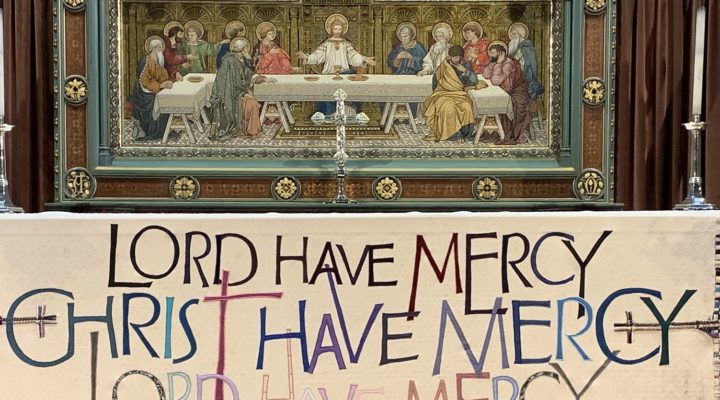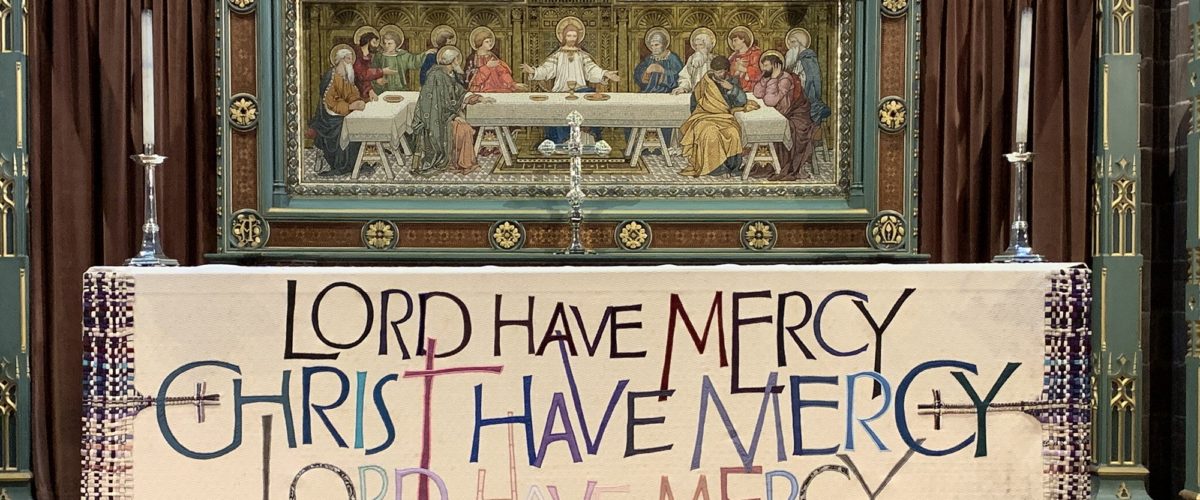“Hey, me too.” That’s what a beloved church member said to me as we were leaving the sanctuary last Sunday after our All Saints Sunday observance. Having him say those words stopped me in my tracks. They made me feel about as beloved as any words a church member ever has said. To understand why, though, let me take you on a journey.
We have a new social media favorite at our house. There is a person who can get our attention every time he posts a new video. At 85 years young, the world-acclaimed chef Jacques Pepin still has it. He probably has forgotten more about cooking than we ever will learn. His skills are still sharp. He wields a knife like a surgeon.

Charles Qualls
During the pandemic, his children began to film and produce little 5-minute segments done right in his home kitchen. They’re called, “Jacques Pepin Cooking at Home.” He demonstrates how to make quality entrees or sides that we actually can reproduce. So, when he adds another video in that series, we often sit down together to watch. We have cooked and enjoyed several things after enjoying his short segments.
As it approaches even now, Thanksgiving is a day we look forward to each year. We have a few rituals that have traveled with us over time. Most years, we have put up the Christmas tree and watched a lot of football. It’s also a day when we normally eschew traditions, instead using that as a grand time of culinary experiment with whatever recipe has caught our fancy.
We weren’t always as relatively skilled in cooking at our house as we are these days. We’ve come a long way. I am thinking of some of the more memorable Thanksgiving feasts Elizabeth and I have shared over the years.
We still laugh about our very first Thanksgiving as a married couple. We made a full turkey and attempted all the trimmings. But we didn’t really know what we were doing. The turkey itself was not memorable. The potatoes and green beans were good. The dressing was OK, but probably not what either of our mothers made. We tried.
The giblet gravy is where things really fell off by the wayside. We didn’t have half of what we needed to make it. And we didn’t follow the recipe as precisely as we could have with what we did have. “Inedible” is a word that comes to mind.
“The giblet gravy is where things really fell off by the wayside.”
So as I mentioned, we’re both pretty decent cooks nowadays. Thanksgiving can be a grand feast some years, if we’re in the mood. We love to host. We love to have company, especially old friends with whom we have shared some life. A good meal gives us a platform from which memories can be made. A brief season of hospitality where we can continue discovering riches in people we thought we knew quite well.
Someone has said, “Friendships begin when one person says to the other, ‘Hey, … me too!’” I think that explains a lot about life. Many churches gather each year on All Saints Sunday to put their arms around each other and say a collective, “Hey, … me, too!” This past week, we considered Isaiah 25: 6-9 as we held that service with our congregation. Isaiah serves up a pretty grand feast for us there in the text.
Food has a power that goes beyond mere nutrition. Our meals can be a platform, a reason to gather with others and share life. Goodness knows, we Americans abuse food and overindulge. But Isaiah has a word of hope to deliver in this section and gathers us around a heavenly table because it is there that the glory of God’s presence for our living can perhaps be best illustrated.
One could argue that in the Bible, table gatherings often signal monumental occasions. The exodus from Egypt began with families gathered to eat. In Esther, a grateful Jewish people were told to gather and celebrate their rescue from genocide by having a great meal. This gave rise to the annual Feast of Purim. Jesus Christ entered into his ultimate moment of passion by gathering his disciples around a table.
“Food has a power that goes beyond mere nutrition.”
Amy Erikson has written of this text that for a world that can sometimes make us feel so vulnerable and painful, God offers a feast of hope in Isaiah 25. Hope that is found in the company of others who gather around. The hope that our shared experiences, even of death and loss, will bring understanding and accompaniment. Hope that is found in the presence of the divine, who is never quite as far from our lives as it sometimes seems.
While we are all longing for a day when death is no more, what God offers here is the end of mourning. Isn’t that the lingering issue when we lose loved ones? In this realm, now is not the time when death will be no more. But God will at least visit our times of grief. God will offer guidance and company as we move forward. God is present in our times when we mourn as we should.
In fact, Michael Ruffin notices in his commentary that Isaiah here speaks to what has been, what is and what is yet to be. In any given year, you may sit down at the Thanksgiving table and say, “Boy, we’ve been fortunate this year. We’re all here and everyone’s healthy.” If that is your family this month, you have a lot for which to give thanks.
In any given year, we could come to Thanksgiving Day, or even this past All Saints Sunday, and be reflecting on the fresh grief of having lost one or more loved ones. If that is you, the church is at her best when we gather around a feast of love and empathy to say, “We noticed. Oh, and hey, … me too.”
All have lost. Some have lost loved ones more recently. Others will someday lose their beloved and will seek comfort in the care and presence of others who have known that same loss. That’s church. That’s us. Isaiah calls us to find the presence of God in what we know.
“In his own family, both this church member’s brother and sister-in-law had died within the same week recently.”
Just as God defeated Pharaoh and the people feasted, God gathers us now to acknowledge that one day, God will defeat the ultimate foe. But what about right now? What about your grief or mine?
We get through it together, in the presence of one who also can defeat another pretty stout foe — our mourning. God can help us to mitigate our grief. For now, God will serve up for us a feast of hope in Isaiah 25. On this and any other All Saints week, I pray you’ll come to the table.
So it was that a beloved in our church connected with a central phrase in my sermon this past week. He stopped me in the sanctuary and circled around in front of me. I could tell he had something on his mind.
In his own family, both this church member’s brother and sister-in-law had died within the same week recently. He knew that Elizabeth and I had lost parents within 90 days of each other last year. His gentle, loving voice was pitch-perfect. He looked me in the eyes and gave me the very gift I had tried to impart to an entire congregation during this annual installment of All Saints Sunday when he simply stopped me and said, “Hey, … me too.”
Charles Qualls serves as pastor of Franklin Baptist Church in Franklin, Va. He is the author of eight books.
Related articles:
Saints don’t have to be dead: gratitude for regular, blessed folk through whom goodness shines | Opinion by Molly Marshall
Abiding in thin places: Día de los Muertos and lessons from loved ones passed | Opinion by Paula Mangum Sheridan
In the first year of grief, walk the perimeter | Opinion by Michael Chancellor


